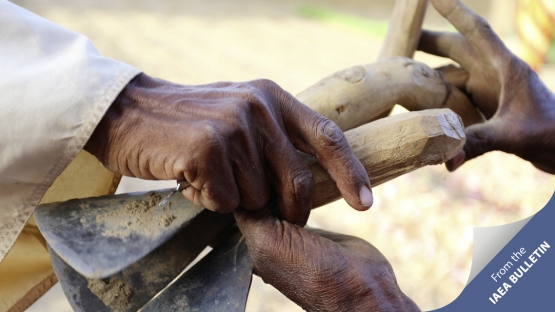Partnerships with Member States are at the heart of the IAEA’s activities. They help countries use nuclear science to meet their development targets and achieve lasting impact. Further improving partnerships will be a key theme at the IAEA Technical Cooperation Conference from 30 May to 1 June in Vienna.
Participants at the conference will discuss how nuclear technologies — and the IAEA — can contribute to the achievement of the Sustainable Development Goals (SDGs). The 17 goals and their targets are a comprehensive approach to global development that relies on strong coordination. This is reflected in Goal 17 on partnerships.
“The SDGs are a major undertaking that no country, organization or person can reach alone; partnerships are vital to their success,” said Emma Webb, Head of the IAEA’s Strategy and Partnership Section. “The IAEA plays an active role in building and cultivating cooperation worldwide toward achieving these goals.”
As countries implement their national development strategies and plans, many turn to the IAEA and its partners to help them use nuclear science and technology to meet their objectives. Longstanding IAEA partnerships, such as the one with the Food and Agriculture Organization of the United Nations (FAO) and cooperation with the World Health Organization (WHO), allow international organizations to contribute their skills and resources in their respective areas of expertise to support development worldwide. Over 90 countries already have country programme frameworks in place that identify areas of cooperation with the IAEA in support of national development priorities.
The IAEA, in cooperation with its partners, supports countries in building their capacities, expanding their networks and sharing knowledge through technical cooperation projects and coordinated research activities. This takes the form of training, fellowships, the provision of equipment and expert guidance, among others. Through this, professionals strengthen their knowledge, sharpen their skills and get the tools they need to achieve sustainable results such as improving health through radiation medicine and ensuring energy for the future by safely and securely adding nuclear power to a national energy mix (see How the IAEA Assists Newcomer Countries in Building Their Way to Sustainable Energy).
Science, technology and innovation are key dimensions of sustainable progress. Cooperation enhances knowledge sharing, technology transfer and evidence-based decision-making.
In line with the targets of Goal 17, international and regional IAEA projects provide a platform for developing and developed countries to join efforts and expand their knowledge of and access to scientific expertise as well as further technological innovation for development. They also enable specialists to work collaboratively to examine and tackle issues, such as how to mitigate the climate change effects of greenhouse gas emissions from agricultural production (see Scientists Join Forces to Study Soil to Find Ways to Reduce Greenhouse Gas Emissions), and improve or learn new skills, such as 3D radiation therapy planning for cancer care (see 3D Radiotherapy Increases Effectiveness and Safety of Cancer Treatment in Tanzania).
Through this scientific work, scientists can collect the data decision makers need for evidence-based policies and programmes (see Precise progress). The strong emphasis on data and monitoring under Goal 17 provides further space for the IAEA and its partners to support results-oriented development planning and programming.
“The peaceful uses of nuclear science and technology have a unique role to play in responding to countries’ national priorities and in supporting sustainable development,” said Webb. “It is in part through these partnerships between the IAEA, governments and other entities, that science and technology can help support communities and can help deliver on the ambitious global commitment of the SDGs and advance the five ‘Ps’ outlined in the Agenda 2030 preamble: people, planet, prosperity, partnerships and peace.”





